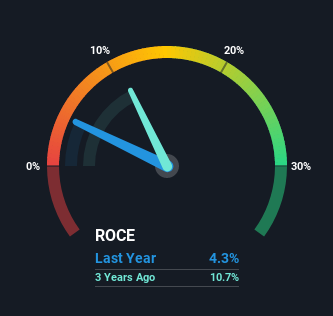- Poland
- /
- Commercial Services
- /
- WSE:CTS
These Return Metrics Don't Make City Service (WSE:CTS) Look Too Strong

Ignoring the stock price of a company, what are the underlying trends that tell us a business is past the growth phase? When we see a declining return on capital employed (ROCE) in conjunction with a declining base of capital employed, that's often how a mature business shows signs of aging. Basically the company is earning less on its investments and it is also reducing its total assets. And from a first read, things don't look too good at City Service (WSE:CTS), so let's see why.
Return On Capital Employed (ROCE): What is it?
Just to clarify if you're unsure, ROCE is a metric for evaluating how much pre-tax income (in percentage terms) a company earns on the capital invested in its business. Analysts use this formula to calculate it for City Service:
Return on Capital Employed = Earnings Before Interest and Tax (EBIT) ÷ (Total Assets - Current Liabilities)
0.043 = €2.8m ÷ (€101m - €37m) (Based on the trailing twelve months to September 2021).
Therefore, City Service has an ROCE of 4.3%. In absolute terms, that's a low return and it also under-performs the Commercial Services industry average of 13%.
View our latest analysis for City Service

While the past is not representative of the future, it can be helpful to know how a company has performed historically, which is why we have this chart above. If you want to delve into the historical earnings, revenue and cash flow of City Service, check out these free graphs here.
So How Is City Service's ROCE Trending?
The trend of returns that City Service is generating are raising some concerns. The company used to generate 6.2% on its capital five years ago but it has since fallen noticeably. What's equally concerning is that the amount of capital deployed in the business has shrunk by 29% over that same period. When you see both ROCE and capital employed diminishing, it can often be a sign of a mature and shrinking business that might be in structural decline. Typically businesses that exhibit these characteristics aren't the ones that tend to multiply over the long term, because statistically speaking, they've already gone through the growth phase of their life cycle.
In Conclusion...
To see City Service reducing the capital employed in the business in tandem with diminishing returns, is concerning. Since the stock has skyrocketed 184% over the last five years, it looks like investors have high expectations of the stock. Regardless, we don't feel too comfortable with the fundamentals so we'd be steering clear of this stock for now.
One more thing: We've identified 3 warning signs with City Service (at least 1 which is a bit unpleasant) , and understanding them would certainly be useful.
If you want to search for solid companies with great earnings, check out this free list of companies with good balance sheets and impressive returns on equity.
New: AI Stock Screener & Alerts
Our new AI Stock Screener scans the market every day to uncover opportunities.
• Dividend Powerhouses (3%+ Yield)
• Undervalued Small Caps with Insider Buying
• High growth Tech and AI Companies
Or build your own from over 50 metrics.
Have feedback on this article? Concerned about the content? Get in touch with us directly. Alternatively, email editorial-team (at) simplywallst.com.
This article by Simply Wall St is general in nature. We provide commentary based on historical data and analyst forecasts only using an unbiased methodology and our articles are not intended to be financial advice. It does not constitute a recommendation to buy or sell any stock, and does not take account of your objectives, or your financial situation. We aim to bring you long-term focused analysis driven by fundamental data. Note that our analysis may not factor in the latest price-sensitive company announcements or qualitative material. Simply Wall St has no position in any stocks mentioned.
About WSE:CTS
City Service
Provides facility management and integrated utility services in Lithuania and Latvia.
Outstanding track record with adequate balance sheet and pays a dividend.
Market Insights
Community Narratives



